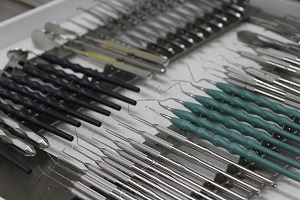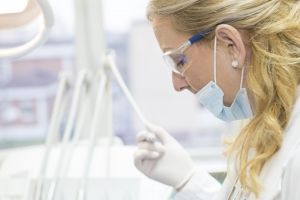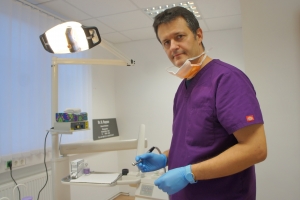Professional dental cleaning - Nowadays a Must-Do in dental care
We can certainly all relate to this: you are sitting in a car or a bus or another means of transportation and you're waiting for it to get going, for the next stop, for the traffic jam to dissipate, and you're subconsciously moving your tongue across your teeth only to be surprised by a rough instead of a smooth surface. How annoying. Fortunately, modern dentistry has very closely diagnosed this condition and devised a very effective and time-saving procedure to handle it: the professional dental cleaning. This procedure can be performed either by a trained dental hygienist or by a dentist and focuses on the sustainable removal of dental plaque that form over time on the surface of teeth.Since we have already written several articles about the workflow and costs of a professional dental cleaning procedure, which are available in article 1, article 2, and article 3, we will not repeat this information in this blog post, besides giving a very brief recap of the most important points, and will instead focus on areas that we have not yet discussed:
- Procedure: Professional dental cleaning with an ultrasound cleaning device
- Goal: Removal of harmful dental plaques and of dental calculus
- Recommended Frequency: ideally once every 6 months or more frequently (i.e., 2+ times per year)
- Reimbursement by Health Insurers: currently very limited to non-existent
Some more information about professional dental cleanings is also available on the helpful website of updent32 which is called zahntips.at (more information right here).
Also important to mention is that periodically performed oral hygiene procedures can under no circumstances replace thorough and daily dental care. We have written about this topic in detail with regards to dental care for children because, the sooner one acquires good habits, the better. So, do not neglect daily oral care and also make sure to floss at least once every day.
Let us now move on to a few more new topics that take a look at professional oral hygiene from the point of view of a dental care professional.
I would like to offer dental cleanings in my practice – Where do I start?
For a dental care professional, it makes a lot of sense to include the professional oral cleaning procedure in a dentist's service offering. On the one hand, it is a clearly necessary and useful part of a person's dental care since prophylaxis is always preferable to treating an actual problem at a later date. On the other hand, it is also conducive to practice operations and profitability to perform oral hygiene procedures because they take up relatively little time and relatively few materials and little labor (as compared to other, more complex treatments, such as, for example, a root canal treatment). But where should a dentist begin to start offering this prophylactic treatment?Well, at first, it is always helpful to get a good overview of the basic requirements for a new treatment and to then fulfill them on a step by step basis with the goal of effectively upgrading your service offerings. In simple terms, the requirements for a successful oral hygiene offering include the following:
- Education: As any and every other dental care procedure, the professional oral cleaning also requires thorough training before starting to perform it for patients. Fortunately, due to the growing importance of prophylaxis in dental care, dental schools have set up specialized courses and even a dedicated degree to prepare students for their jobs in a targeted and professional way. We already mentioned the profession of a dental hygienist in this article and have written a separate article about this topic. In short: as a student in the field of dental care, one may acquire all the necessary skills to successfully execute professional oral hygiene procedures at local universities. This is possible both as part of a curriculum focused on dentistry as well as via a separate professional pathway focused on dental hygiene. Irrespective of which way a student chooses, education always precedes practice.
- Medical Technology: After successfully completing an education as a dental hygienist or dentist, comes the acquisition of all necessary equipment and materials that are needed for the execution of the procedure. We already mentioned modern ultrasound devices called ultrasound scalers with which dental care professionals can nowadays perform oral cleanings. These scalers produce ultrasound waves that are transmitted onto the dental surface in order to clean up all harmful plaques that may have accumulated there. The best aspect about this treatment approach is that it is almost 100% pain-free and that it significantly simplifies the work of a dentist by making manual removal of plaques with dental scalers irrelevant. Sounds great, right? But who manufactures these ultrasound scalers? Fortunately, several very experienced dental equipment manufacturers have specialized in this area and offer a broad palette of options for dental care professionals. A few examples of some of the leading ultrasound scaler manufacturers are the companies NSK Dental, EMS Dental, Acteon and W&H.
- Consumables: After the purchase of an ultrasound scaler device, a dentist still needs a sufficiently large amount of consumables because, as is the case with any other device, a scaler also becomes worn out over time. The most important point here is to always stock up on a sufficiently large amount of scaler heads which are essential for the successful completion of the procedure. It is also advisable to stock up on manual scalers to have the option of removing plaque by hand whenever the machine is out of business. Leading manufacturers in this space are the companies Dentsply Sirona, Transact International, B. A. International und Dürr Dental.

Instrumente zur Zahnreinigung (Quelle: https://pixabay.com)
- Sourcing / Supply: And last but not least, a dentist has to find the best option for his first and for follow-on purchases when selecting his preferred device. There are also fortunately some options in the form of very intuitive online portals for optimal transaction execution from virtually anywhere. Some of the leading online portals and shops in the space of dental medicine, all of which offer everything that a successfully executed oral cleaning procedure requires, are the following: MedicalExpo, Idealo, dentalgerate.com, Denta-Tec, preis.de und dentalkauf24.
Well there you have it – our professional oral hygiene starter kit. Of course we have simplified some of the steps in the interest of keeping the article length manageable (e.g., it is always great to get advice from experienced dentists prior to selecting the right scaler for you and to remain in close contact with device manufacturers, etc.). Nonetheless, the main and most important elements are listed here and we hope that this compact guide is both interesting as well as useful and informative for you and all of our readers.
The chapter called professional oral hygiene is not quite yet done because we still need to assess and explain the role of dental labs in this value chain.
Professional Oral Cleaning and Tooth Replacement – How do they fit together?
Whether young or old (in this case, for the most part, older), many of us have at least one form of tooth replacement integrated in their jawlines. Maybe a tooth had to be pulled due to excessive caries infestation, maybe there was an accident that caused a tooth to break off, or maybe it was just old age which, over the course of time, wore off all teeth to the point where they had to be replaced.There are as many reasons for permanent tooth replacements as there is sand on the beach and just because one or more teeth are not real anymore, does not mean that they do not need to be cleaned like healthy teeth anymore because plaque and other harmful bacterial films do not differentiate between healthy and fake teeth. For dentists and dental hygienists, nothing changes at first because it is the same cleaning approach that is used for healthy as well as for fake teeth. In some cases, complications may arise that deal damage to a tooth's surface and an educated and experienced dental technician is required to fix the situation.
In the cases of dental crowns and bridges, replacement is usually the way to go, given that the repair of these tooth replacement forms does not make sense from a price perspective. When replaceable tooth replacements are concerned (e.g., partial prosthetics), things look very differently because depending on how large and complex a prosthetic is, the repair may be faster and cheaper than a replacement. And this is exactly where dental technicians come into play.
Before we take a closer look at the repair of dental prosthetics, it is important to remind ourselves that prophylaxis is always the optimal approach to avoid costly treatments. Therefore, it is more than advisable to keep a prosthetic clean with special cleaning supplies in order to avoid potential complications during an oral cleaning with a dentist. Fortunately, there is a broad selection of of prosthetic cleaners that can make your choice significantly easier and you can take a look at some comparison data in the following portals: Vergleich.org, bestenz and test.de. One can buy such prosthetic cleaners in drug stores such as, for example Bipa and dm, as well as in other Online Shops and in other online portals like Amazon, reinerdent3 and plandent. More details and infos about the topic of prosthetic preservation and cleaning can be found at denta-expert. Also, don't forget to always keep your prosthetic clean.
Now, let's look at a serious case. If a dental prosthetic happens to take damage during a routine oral hygiene procedure (advice: always take out removable prosthetics prior to an oral hygiene procedure to prevent damage), then it can be put together again by a trained dental technician. Some of the local dental labs that offer such repairs are Dental-Labor Brokes and Schwano-Dent.
As should be obvious now, there is a lot of preparation, work, and so called know how that goes into the typical 30-minute oral hygiene procedure which a patient has to undergo every 6 months or so and its successful execution depends on effective interplay between dentist, dental hygienist, and a practice team around them.
We hope that you liked this blog post and wish you all the Best.
For more interesting stories, please take a look at the DentalAce blog and join our community via a free subscription. For questions, feel free to reach us at dentalace@acemydental.com and at 01 925 38 19.
All the Best and see you soon!


